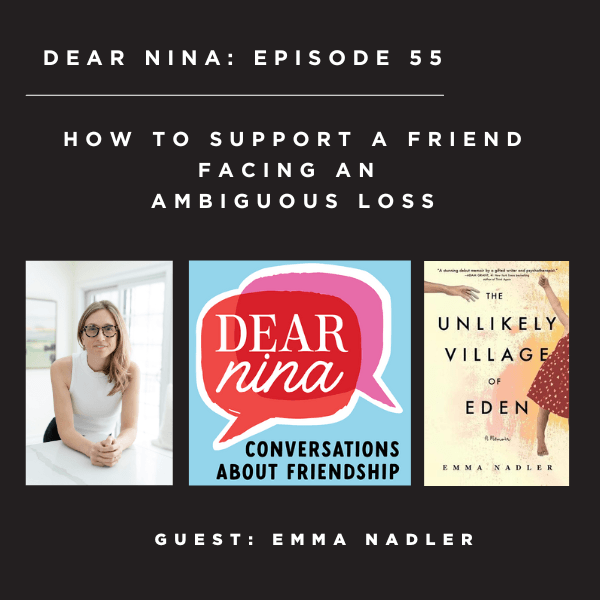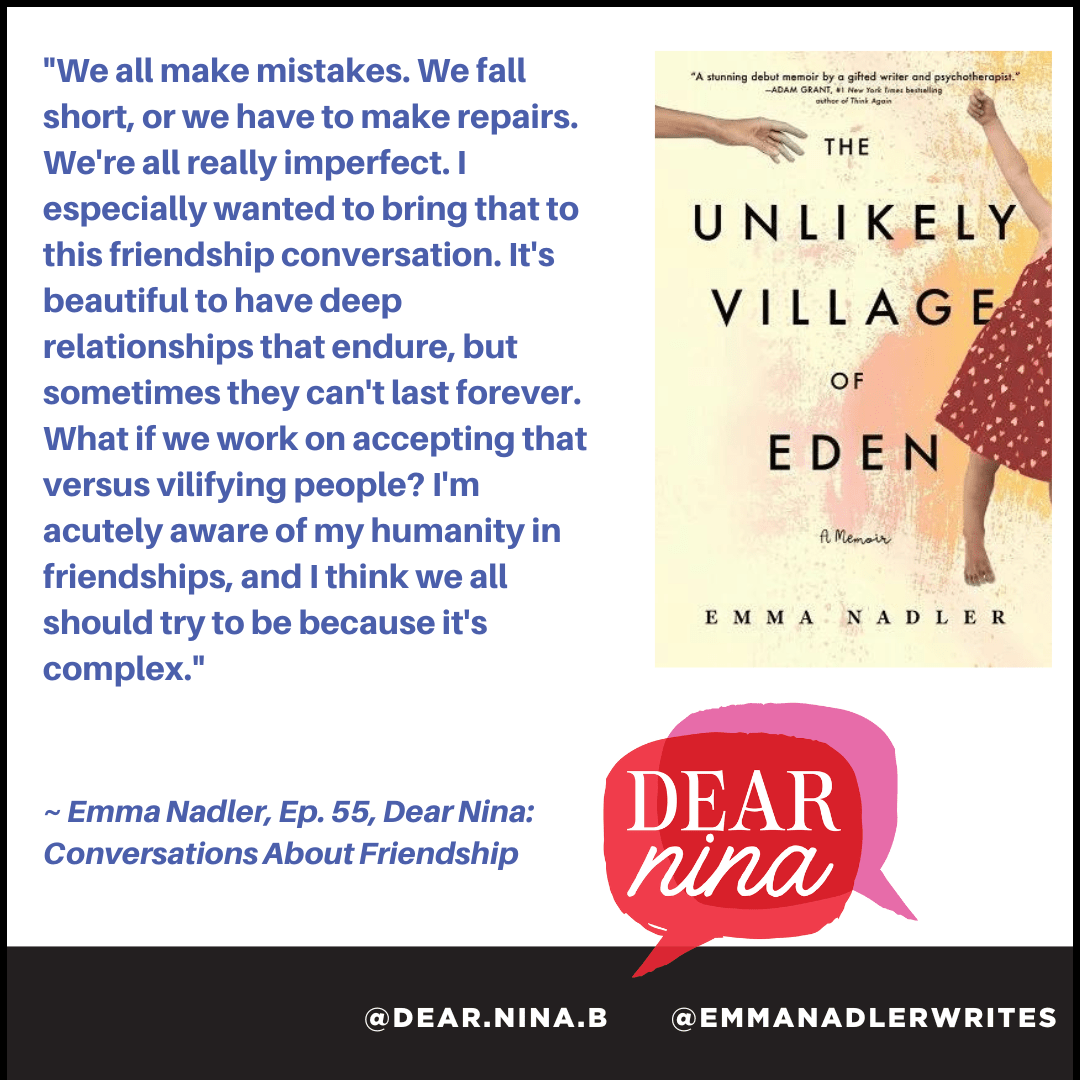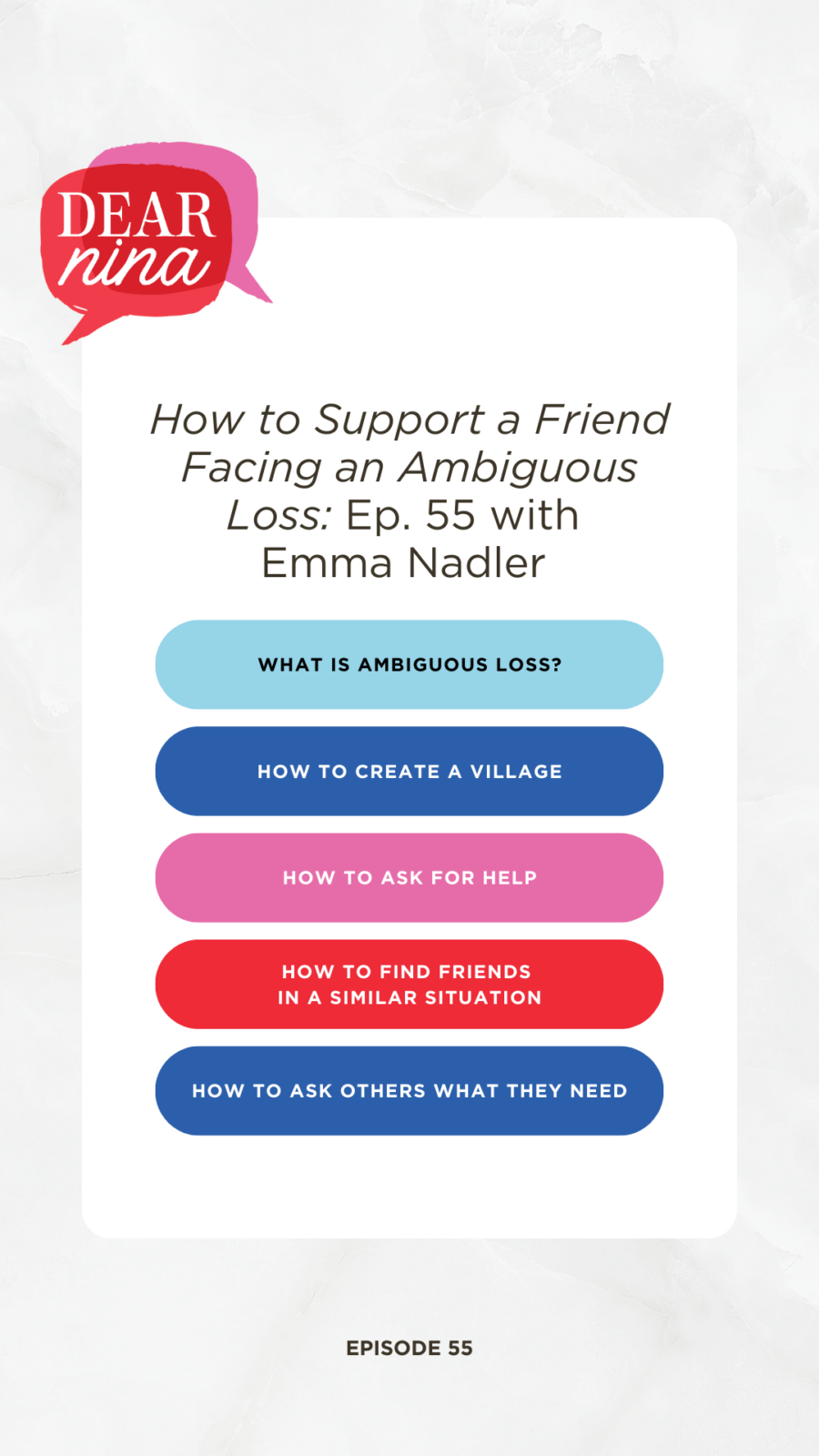Welcome to another episode of Dear Nina: Conversations about Friendship. Today we’re talking about how to support friends facing an ambiguous loss. My guest, Emma Nadler, is a psychotherapist in Minneapolis and the author of The Unlikely Village of Eden. Emma’s incredible memoir is about grief, healing, marriage, friendship, and letting go of believing that parenting needs to be entirely about self-sacrifice. Our discussion doesn’t require anyone to have read The Unlikely Village of Eden yet. Though I highly recommend you do! It’s a beautifully written memoir and a thoughtful read with humor too.
About the book:
One afternoon, Emma Nadler gets a call from her daughter’s doctor that changes her life forever. Faced with the realities of raising a child with a rare genetic condition, Nadler must confront her preconceptions of motherhood and her perfectionistic beliefs.
With a generous wit and a wide-open mind, Nadler—who also happens to be a psychotherapist—offers a rare window into the unconventional ways she and her family adapt to their improbable path. Every relationship in her life—with herself, her husband, children, friends, and even clients—is reimagined as she navigates the heartbreak and hilarity of her daily life.
As she and her husband join the 53 million caregivers in the United States, Nadler wrestles to belong in a society that devalues both caregivers and people with disabilities. She challenges the scripts that mothers should be martyrs, or that self-sacrifice is a necessary component of love. Nadler illustrates the complexity, grief, and joy of living an unexpected life, all with the wisdom of a therapist, the heart of a loving parent, and the ingenuity of a queer woman who refuses to be shackled by cultural expectations.
FIND EPISODE #55 ON APPLE PODCASTS, SPOTIFY, OR ANYWHERE YOU LISTEN TO PODCASTS!
Signup for my newsletter on friendship, books, TV, and more.

Meet Emma Nadler
Emma Nadler is an author, speaker, and psychotherapist. In her private practice, she helps people better understand and tolerate emotions, build deeper relationships, and find meaning in life’s challenges. She is passionate about transforming her own experiences as a parent of a child with disabilities into empathy, compassion, humor, and of course, stories. She lives in Minnesota with her family. To learn more, visit EmmaNadler.com. And @EmmaNadlerWrites on Instagram.
More praise for the book!
“The Unlikely Village of Eden is a wonderful read: lyrical, funny, heartbreaking, heart-healing, and deeply inspiring. With her writing and her life, Emma Nadler has created a testament to the resiliency of parents, children, friendships, marriage, and every other manifestation of human love.”―Martha Beck, New York Times bestselling author of Expecting Adam and Leaving the Saints: How I Lost the Mormons and Found my Faith
“Such a gorgeous book. An honest, difficult, and hopeful look at what it means to create a family.”―Jenny Lawson, New York Times bestselling author of Furiously Happy and Broken (in the Best Possible Way)
“A stunning debut memoir by a gifted writer and psychotherapist. Emma Nadler has written a truly poignant read that shines a light on the humanity in neurodivergence, the heart of parenting, and the soul of psychotherapy.”―Adam Grant, #1 New York Times bestselling author of Think Again and host of the TED podcast Re:Thinking
Topics We Covered:
- Defining an ambiguous loss
- Finding friends in a similar situation
- Asking for what you need when you’re facing an ambiguous loss
- When trying to help, asking friends facing an ambiguous loss what they need
- Creating a village from unexpected people who come into your life
- Understanding that not all friendships from before this loss will survive your new situation and letting go of the instinct to vilify those friends
- Accepting that you cannot always be the friend you hoped to be
Highlights from my conversation with Emma:
What is an ambiguous loss?
Emma: The term ambiguous loss is, coined by Dr. Pauline Boss, who is a researcher and educator out of the University of Minnesota. What the term means is it’s a loss that cannot be resolved. It’s a loss with some ambiguity. An example of that would be a missing person. It might be a catastrophic illness, a serious mental health issue, a breakup or a divorce. Some of the specifics matter. For example, with a breakup or a divorce, how understood were the reasons? How much process did it get or understanding from the person who’s living with that loss?
There are so many ways ambiguous losses can play out and can be in our lives from more minor concerns to something much more major and life impacting. Most of us have some kind of an ambiguous loss that we’ve known, or at least, know someone who has one.
A short intro to Emma’s experience with an ambiguous loss:
Emma: Our daughter was born with a rare genetic deletion. She’s missing DNA. We discovered this after she was having some feeding and sleeping challenges and developmental delays. And we discovered it early on when she was still a baby, and we got information from the medical team that we were working with that it was really uncertain how her life would go. We didn’t know if she would walk or talk or what the different challenges would be that she might face medically, but there were many that were deeply possible, and we wouldn’t know because there were so few people who have this deletion. It doesn’t have a name. That’s how rare it is. It might have a syndrome connected to it, but it doesn’t exactly have a name. And so in a moment everything changed for us.
We discussed what was helpful to Emma in those early years.
A quote from the book: “People who could handle how demolished I sometimes felt and yet also access some levity were everything to me during the early years of Eden’s life.”
Emma: That quote is about holding the hard and let’s still make a good life. Let’s still find joy. Let’s still laugh as much as we humanly can together. Let’s still dance in our living room and let’s cry sometimes because that’s part of being alive and that’s part of holding this heavy thing. And to me, finding people who were able to hold both and be with me in all those kinds of moments—That was what was most helpful to me.
When Eden was in the hospital, and I spent a lot of time in the hospital with her in the early years, I would try to make the nurses laugh because I’m here, and I’m alive, and here we are, and this is my life right now. And I cried plenty. It was all there, and a lot of this process for me has been about reclaiming and declaring that I am still going to have a good life. And I have to watch my daughter suffer, and that is really hard. I wish I could take that away. I wish I could make it better for her. She struggles with a lot of medical challenges. Vomiting. She’s on a feeding tube. She has a lot of behavioral challenges that are really difficult. And I still want to say we can still have a good life and fight for that.
And I want to be around people who believe that too, and don’t pity us or think that we’re less than because we have this kind of wild thing we’re doing. And there are a lot of people out there who are willing to go along with that adventure and really be allies. And I also feel really lucky I’ve gotten to meet some of the best people, that I never thought I would get to meet.
The one other thing I wanna say about it is I don’t think we know who we’re going to meet on any adventure. We don’t know who we’re going to meet and the possibilities they’re going to bring into our lives. And I really have gotten to meet people who’ve blown my mind with their kindness and generosity.
PLEASE NOTE: Listening to this podcast in no way creates a client/therapist relationship with Emma Nadler. No legal, counseling, or other professional services are being rendered and nothing is intended to provide such services or advice of any kind. If you are having a mental health emergency, please contact 911 or go to your nearest emergency room. You can also text or call 988 for the Suicide and Crisis Lifeline.
Let’s connect!
- Here’s my Substack newsletter about friendship & more
- JOIN the Dear Nina Facebook group
- Ask an anonymous question
If you like what you’re hearing, please tell a friend!
Also, if you can rate and/or leave a review on Apple Podcasts, I’d be so grateful.
Latest posts by Nina Badzin (see all)
- Overtalking, Undertalking, and Lessons for Friendships in the Art of Storytelling - April 30, 2024
- Dear Nina in The Wall Street Journal - April 27, 2024
- 5 Friendship Issues to Consider Addressing with a Therapist - April 17, 2024
- Subtle Friendship Slights and Changing Your Instagram Handle - April 10, 2024




